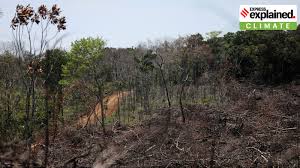IPBES Nexus Report

- 22 Dec 2024
In News:
The IPBES Nexus Report, formally titled The Assessment Report on the Interlinkages Among Biodiversity, Water, Food, and Health, was released to address the interconnected global challenges of climate change, biodiversity loss, food insecurity, water scarcity, and health risks. The report stresses that these challenges are deeply intertwined and cannot be solved separately; doing so would lead to ineffective or even counterproductive results.
Key Highlights of the Nexus Report
- Interconnections Between Global Challenges: The report emphasizes the strong interlinkages between the five major global challenges:
- Biodiversity Loss
- Water Scarcity
- Food Insecurity
- Health Risks
- Climate Change
It argues that efforts to address these challenges independently are ineffective and often exacerbate the problems. For example, scaling up food production to combat hunger can put more pressure on land, water, and biodiversity.
- Economic Cost of Biodiversity Loss:
- Global GDP Dependency: Over half of the global GDP (approximately $58 trillion annually) depends on nature. Biodiversity degradation significantly undermines productivity and economic output.
- Unaccounted Costs: The neglect of biodiversity in economic activities contributes to a loss of $10-25 trillion annually.
- Delayed Action: Delaying action on biodiversity conservation could double the costs within the next decade, potentially incurring $500 billion per year in additional costs.
- Synergistic Approach: The report identifies over 70 response options that promote synergistic outcomes across the five challenges. These include:
- Restoring Carbon-Rich Ecosystems: Such as forests, soils, and mangroves to address climate change and biodiversity loss.
- Managing Biodiversity to Prevent Disease Transmission: Effective biodiversity management reduces risks of diseases passing from animals to humans (zoonotic diseases).
- Sustainable Diets: Promoting diets that are both healthy and environmentally sustainable.
- Nature-Based Solutions: Implementing solutions that rely on natural processes to mitigate challenges like water scarcity and climate change.
- Inequality and Vulnerability: The report highlights how inequality exacerbates the challenges. Vulnerable populations, especially those living in areas where biodiversity has sharply declined, face increased health risks, malnutrition, and economic instability. 41% of people live in regions where biodiversity loss has been particularly severe, and 9% face high health burdens due to these declines.
- Principles for Transformative Change: The report outlines principles for achieving transformative change:
- Equity and Justice: Ensuring fair distribution of resources and opportunities for all.
- Pluralism and Inclusion: Embracing diverse perspectives and voices in policy-making.
- Respectful Human-Nature Relationships: Recognizing and nurturing reciprocal relationships between humans and nature.
- Adaptive Learning and Action: Continuously evolving policies and strategies based on feedback and new evidence.
- Urgency for Immediate Action: The report stresses that immediate action is critical. If the world continues to neglect biodiversity, it will face not only environmental collapse but also a missed opportunity for economic growth. Immediate implementation of nature-positive strategies could unlock $10 trillion in business opportunities and create 400 million jobs by 2030.
The IPBES Transformative Change Assessment Report
- This report builds upon the 2019 IPBES Global Assessment Report and advocates for transformative change to halt biodiversity loss and achieve global development goals. It defines transformative change as a system-wide shift in:
- Views: Changing how we think about nature and its value.
- Structures: Reforming systems of governance and organization.
- Practices: Changing behaviors and practices that harm nature.
Key Challenges to Transformative Change:
- Disconnection from Nature: Human societies' disconnection from nature, often rooted in historical domination, is a major cause of biodiversity loss.
- Economic Inequality: The concentration of power and wealth exacerbates environmental degradation.
- Unsustainable Consumption: Unsustainable patterns of consumption and production are significant drivers of environmental harm.
Synergistic Strategies for Transformation:
- Conserve and Regenerate: Restore ecosystems that have both ecological and cultural value.
- Mainstream Biodiversity: Integrate biodiversity considerations into sectors like agriculture, forestry, and infrastructure development.
- Transform Economic Systems: Adopt policies such as true cost accounting and sustainability-based tax principles to internalize the environmental costs of economic activities.
- Inclusive Governance: Promote governance systems that involve all stakeholders, especially local communities, in decision-making.
